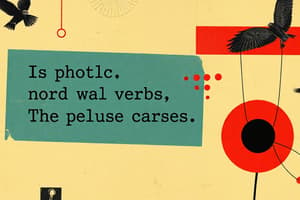Podcast
Questions and Answers
A relative clause can be differentiated from a main clause because it is ______.
A relative clause can be differentiated from a main clause because it is ______.
dependent
The verb 'listen' can be combined with the preposition ______ to indicate waiting.
The verb 'listen' can be combined with the preposition ______ to indicate waiting.
to
In superstitions, a ______ is often considered a sign of good luck.
In superstitions, a ______ is often considered a sign of good luck.
horseshoe
To express being romantically involved with someone, you can say you are ______ with them.
To express being romantically involved with someone, you can say you are ______ with them.
In body language, a confident person might ______ their head while speaking.
In body language, a confident person might ______ their head while speaking.
Flashcards are hidden until you start studying
Study Notes
Relative Clauses
- Relative clauses provide additional information about a noun and begin with relative pronouns like who, whom, whose, which, and that.
- Main clauses can stand alone as sentences, while dependent clauses cannot function independently.
- Identifying dependent clauses: if a clause cannot exist as a complete sentence by itself, it is dependent.
Relative Pronouns
- "Who" refers to people.
- "Which" and "that" refer to things or animals.
- "Whom" is used for the object of a verb or preposition.
- "Whose" indicates possession.
Verbs + Prepositions
- "Listen to": actively paying attention to sounds.
- "Wait for": anticipation of an event or person.
- "Dream about": contemplating or imagining scenarios during sleep or daydreaming.
- "Believe in": having faith or conviction in someone or something.
- "In love with": feeling deep affection or romantic desire for someone.
Vocabulary in Context
- Omen: a phenomenon that is believed to predict future events, often seen as a sign.
- Horseshoe: a U-shaped metal object, often considered a good luck charm.
- To pet: the act of stroking or caressing an animal affectionately.
- Clover: a plant, with a four-leaf clover particularly symbolizing luck.
- Deem: to consider or regard in a specified way.
- Ladder: a device used for climbing up or down, symbolizing progress or ambition.
- Prosperous: thriving and successful, often used in the context of financial success.
Superstitions
- Horseshoes are traditionally hung above doorways to attract good luck.
- Four-leaf clovers are sought after for their perceived rarity and luck.
Body Language in Different Contexts
- Non-verbal cues can convey a wide range of emotions and intentions.
- Posture, gestures, and eye contact vary in meaning across cultures and situations.
Studying That Suits You
Use AI to generate personalized quizzes and flashcards to suit your learning preferences.




